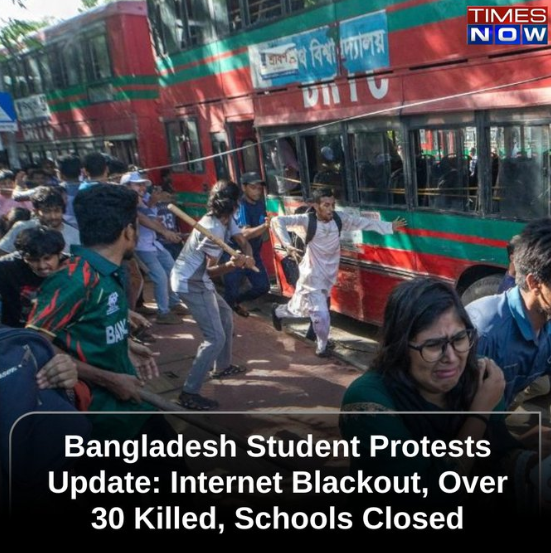Revolution is in the air as government takes action against the people
Bangladesh is in the grip of a severe communications blackout amid escalating protests that have claimed 39 lives this week. The government, facing growing unrest, has blocked mobile internet and halted news broadcasts. On Thursday night, authorities cited security concerns as the reason for cutting off mobile internet access and restricting social media platforms, as tens of thousands of students took to the streets.
Is Bangladesh heading towards a mass coup?
1Over 73 people were killed in police shootings just yesterday.
2The entire country experienced a blackout last night, with no internet, telecommunication, or telephone network.
3Dhaka, the capital, was a hotspot of protests and… pic.twitter.com/fVswRMCR0r— Mahmudul Khan (Apel) (@apel6697) July 19, 2024
By Friday morning, television news channels had gone dark after demonstrators stormed and set fire to the state broadcasting headquarters in Dhaka. The protests, which originated on university campuses, call for the abolition of a quota system that reserves 30% of government jobs for descendants of veterans from Bangladesh’s 1971 war of independence.
Critics argue this policy is biased and primarily benefits members of the ruling Awami League, led by Prime Minister Sheikh Hasina. The situation has rapidly escalated into some of the most significant unrest in a decade. Reports have surfaced of pro-government student groups attacking protesters, while police have responded with teargas and rubber bullets.
Violent clashes between riot police and protesters, armed with batons and bricks, have spread nationwide. Vehicles have been torched, and thousands have been injured in the chaos. The Dhaka Times reported that one of its journalists, Mehedi Hasan, was killed while covering the conflict in the capital.
On Thursday, protesters overran the state broadcaster’s headquarters and set it ablaze. Thankfully, the building was evacuated without casualties. Telecommunications Minister Zunaid Ahmed Palak stated that access to social media was curtailed because it had been used to spread false information.
Bangladesh is having a genoside Right now. This Video shows a continued fire on Bangladesh students and citizens. Bangladesh is completely Blackout from internet we want international attenttion. 🇧🇩🙏 #StarlinkforBangladesh #StarlinkforBangladesh@elonmusk #SaveBangladeshStudents pic.twitter.com/KUtjNcHycv
— Md Rakibul | Video Editor 🎬 (@rakibulhridoy) July 18, 2024
Prime Minister Hasina, 76, ordered the indefinite closure of all universities and colleges. In a Wednesday night address, she condemned the “murder” of students and promised justice, urging students to await a high court ruling on the quota system. However, her speech did little to calm the unrest.
By Friday morning, the sounds of gunfire and stun grenades echoed near Dhaka universities. Witnesses reported that the protests had taken on an anti-government tone, with chants labeling Hasina an “authoritarian dictator.”
Hasina, in power since 2009, has been criticized for her harsh crackdown on political opponents and dissenters. The prime minister has been accused of using paramilitary forces to carry out enforced disappearances and jailing tens of thousands of political adversaries. Her re-election in January was widely criticized as fraudulent.
The situation further deteriorated when Hasina reportedly used the derogatory term “razakars” to describe the protesters, a term for those who collaborated with Pakistan during the independence war. Although the controversial quotas were abolished in 2018, they were reinstated last month by a court ruling, sparking the current outrage. With high youth unemployment in Bangladesh, government jobs are seen as one of the few secure employment options, making the quotas particularly contentious.
Bangladesh Student Protests Update: Internet Blackout, Over 30 Killed, Schools Closed
Read more: https://t.co/byXN2Cbw4Y#Bangladesh pic.twitter.com/OSsd6rtDjm
— TIMES NOW (@TimesNow) July 19, 2024
The Awami League, founded by Hasina’s father who led the independence movement, is accused of exploiting the quota system for its benefit. Pierre Prakash, the Asia director of the International Crisis Group, highlighted that the protests reflect deep-rooted political and economic frustrations in Bangladesh. He pointed to the country’s struggling economy and severe youth unemployment as key factors driving the unrest. Stéphane Dujarric, a spokesperson for the UN Secretary-General, has called for restraint from all parties involved in the conflict.
Major Points:
- Bangladesh enforces a communications blackout amidst violent protests.
- Protests began over a controversial government job quota system.
- Unrest has led to deadly clashes, with police using teargas and rubber bullets.
- Prime Minister Sheikh Hasina has faced criticism for her authoritarian measures.
- The protests reflect broader discontent with economic and political conditions.
Kirk Volo – Reprinted with permission of Whatfinger News



